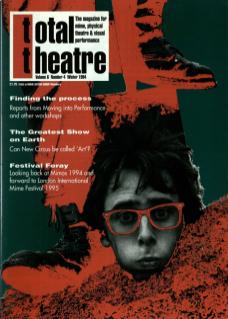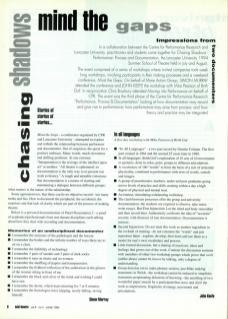Mind the Gaps – a conference organised by CPR and Lancaster University – attempted to explore and rethink the relationship between performers and documenters. Out of suspicion, the quest for a positive embrace. Many words, much cleverness and shifting positions. At one extreme: ‘Interpretation is the revenge of the intellect upon art.’ At another: ‘All theatre is ephemeral, so documentation is the only way to re-present our work to history.’ A rough and unstable consensus that documentation is a means of starting and maintaining a dialogue between different groups: what matters is the nature of the relationship.
Some agreement, too, that there can be no objective record. Too many truths and lies. How to document the peripheral, the accidental, the surprises and that lack of clarity which are part of the process of making theatre?
Below is a personal documentation of Panel Presentation 2 – a panel of academics/professionals from non theatre disciplines each talking about how they deal with recording and documentation.
Memories of an undisciplined documenter
I remember the anxieties of the pathologist and the lawyer. I remember the bodies and the infinite number of ways there are to sit on a chair. I remember the fallibility of technology. I remember three pairs of sandals and three pairs of dark socks. I remember six men on chairs and no women. I remember the shuffling of papers and transparencies. I remember the fishbowl reflection of the auditorium in the glasses of the women sitting in front of me. I remember the black and silver of the trunk and wishing I could have one. I remember the desire, which kept returning for seven or eight minutes. I remember the Sociologist twice tripping, nearly falling, saving himself
Simon Murray
In all languages – A five-day workshop with Mike Pearson of Brith Gof
‘In All Languages’ – a two-part record by Ornette Colman. The first part created in 1964 and the second 25 years later in 1989. In all languages: Brith Gof's exploration of ten sets of ten movements or gestures, done in solos, pairs, groups in different articulations. A vocabulary of 100 ‘words’ to form the basis of a text of articulate physicality, combined in performance with texts of words, sounds and images. A group of practitioners, teachers, under- and postgraduates going across levels of practice and skills, creating within a day a high degree of physical and mental trust. An intense, stimulating exhilarating workshop. The clash between processes of/in the group and university documentation: the students are required to observe, take notes, write essays. But First Injunction: Let the mind and body remember and then record later. Authenticity confronts the idea of ‘accurate’ records with illusions of true documentation. Documentation is mimetic. Second Injunction: Do not treat this work as another ingredient in the cocktail of training – do not consume the ‘words’ and just reproduce them – explore, develop, then learn and use them as a model for one's own vocabulary and process. Little formal discussion, but a sharing of reactions, ideas and feelings that grows out of the work. Contrast the discussion sessions with members of other two workshop groups which prove that work (unlike ideas) cannot be known by talking, only a degree of understanding. Group decision not to make plenary session: just Mike making statements in Welsh – the workshop cannot be reduced to simplistic statements perpetuating delusions of knowing. The unrolling of two wonderful paper murals by a participant that sense and distil the work as impressions, fragments of energy, movement and articulations.

